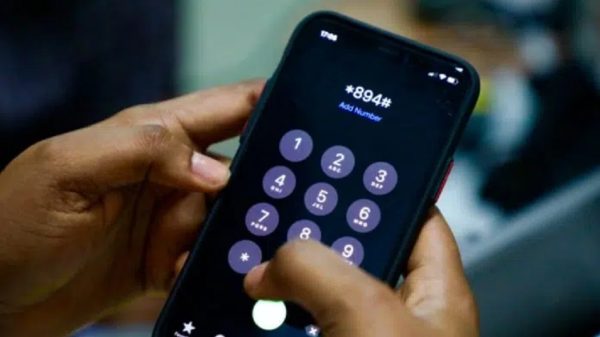By Vanguard Newspaper
The directive last week by the Ministry of Communications and Digital Economy that the National Identity Number, NIN, has become mandatory for a subscriber to carry a mobile phone is not only a slap on the faces of Nigerians already going through very troubled times but a plain manifestation that arbitrariness is being elevated to the dizzy heights of national policy.
Operators have been given only two weeks to comply and ensure that over 190m subscribers on their networks are properly registered. Or your operating license withdrawn.
We view this as a death sentence for the telecommunications industry, and some experts cautioned last week that a reversal of industry fortunes has been set afoot by an obnoxious official proclamation.
One operator moaned that the regulator wants to wipe out at least more than half of the subscriber base of the industry.
We agree that times are desperate in Nigeria, very desperate. Whole mass of students are spirited away from school and they reappear after a whole week in the den of criminals. Road travel has become a nightmare for the ordinary and the mighty ones. Bandits have taken over the roads and the farms.
Quite unfortunately even for the rich, air travel is beyond the reach of those who used to fly except the hedonists who steal the people’s money for plain pleasure.
According to figures from the National Population Commission, NPC, very bizarre decisions are being taken to rubbish the collective intelligence of a nation and expose the citizenry to ridicule before the international community.
So, using failure in security as pressure point, the ministry under the grip of Dr. Isa Pantami has given a directive capable of destroying the entire communications industry except common sense prevails.
The December 15, 2020, statement signed by Public Affairs Director, Dr. Ikechuckwu Adinde, which affirmed earlier directive for operators to totally suspend registration of new SIMs, stated among others: “Operators to require all their subscribers to provide valid National Identification Number, NIN, to update SIM registration records; The submission of NIN by subscribers to take place within two weeks (from today, December 16, 2020 and end by December 30, 2020).
After the deadline, all SIMs without NINs are to be blocked from the networks.” While conceding the pervasive security challenges, there has been outrage across the land; understandably, by subscribers who feel that apart from the suffering that has worsened more because of COVID-19, a major inconvenience is being added to their burden.
Recall that the country’s economy has gone into recession again and is not expected to recover until late 2021, a development that is forcing more Nigerians to fall into the poverty pit.
Vanguard immediately reached out to a powerful industry source to ask if the directive could be executed in two weeks. The answer was an emphatic NO. We also reached out to a source in the regulatory institution. Is this what should have been done? The answer again was NO. Let’s try to unwrap the intricacies of the unfolding story.
The SIM Card registration regime started in 2011. The exercise was carried out simultaneously by licensed agents of the NCC and the mobile operators. NCC was to warehouse the data. An understanding at the time was that, because of the sensitive nature of personal data, all data will be handed over to the National Identity Management Commission, NIMC, whose responsibility it is to manage the National Identity Database.
Till date the progress recorded in that area opens windows to speculations and recriminations. It is interesting to point out here that NIMC was established in 2007. In all the years of existence, the organisation has succeeded in registering only 43.6m! So what magic wand will it wave to accomplish the act in two weeks?
According to figures gleaned from the NCC website, there were 207,954,737 subscribers on the four mobile networks of MTN, Airtel, GLO and 9Mobile by October 2020. An industry source told Vanguard last week that of this figure, about 120m are unique subscribers, discounting double registration of mobile numbers, while the rest could be used in personal internet modems, sectors like banking, vehicle tracking and other sectors where mobile communications have become very handy. There has to be a way to capture these numbers and this cannot be enforced overnight.
Matching the 120m subscriber figure with their NINs is a nightmare which will rubbish the two-week window. For the journey to start at all, all the companies being licensed by NIMC, one expert explained, will have to source for their equipment and get them certified by NIMC before procurement and purchases can take place. To make any meaningful impact immediately, the industry may need at least 250,000 of those machines which are not manufactured here.
Moreover, the NIMC machines are not what are easily sourced in the open market. They are called the 442 machines because they can take four fingers at a go and take the remaining two fingers once. They are more robust than the SIM Card registration machines which can take only two fingers at a time.
The source told Vanguard that this is a logistics nightmare that can hardly be afforded by some of the companies being recruited by NIMC at the moment.
Industry observers are of the opinion that the President Muhammadu Buhari and the National Assembly should put a leash on the minister before he totally destroys the telecommunications industry.
In attendance at the meeting that had to do purely with the regulation of the industry were the CEOs of NCC, the National Information Development Agency, NITDA, and NIMC.
At least one operator told Vanguard they were never at the meeting; instead the minister is taking all the decisions which he is shoving down their throat, thus increasing the fear that the regulator is increasingly losing direction and hold on the industry.
Strains of helplessness are already showing. “We don’t know why the Executive Vice Chairman, EVC, is unable to call some meetings. We are not able to sit down to negotiate on anything,” the source lamented.
Those who fear the directive may become a dangerous super spreader of the COVID-19 pandemic may have been proven right when, last week, somewhere in Abuja, an eye witness told Vanguard that some youths who had gathered for two days at one registration spot, suddenly started demonstrating on noticing the near futility of the exercise and how some advantaged personalities were bending all the rules to favour a few.
The desperation to register will obviously rubbish the PTF recommendation on social distancing in a season of pandemic. Meanwhile, more trouble looms for the industry.
A knowledgeable industry source told Vanguard that, if not properly managed, the directive could destroy half the base of the industry, stymie revenue and investment, and lead to massive job losses.
But all these could pale into insignificance if the minister ever executes his growing threats that “violations of this directive will be met by stiff sanctions, including the possibility of withdrawal of operating license.”
This is hardly the way to speak to organisations that have invested heavily in your economy.
![]()





























































